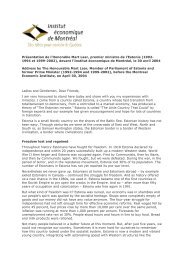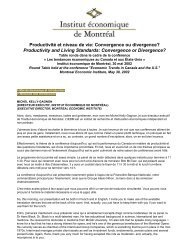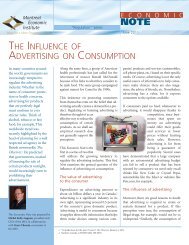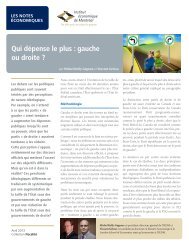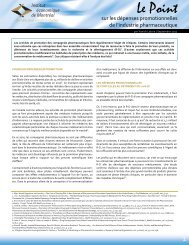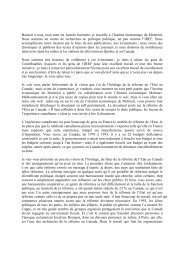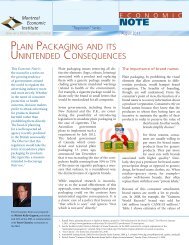The Consequences of a Fixed Book Price - IEDM
The Consequences of a Fixed Book Price - IEDM
The Consequences of a Fixed Book Price - IEDM
Create successful ePaper yourself
Turn your PDF publications into a flip-book with our unique Google optimized e-Paper software.
<strong>The</strong> <strong>Consequences</strong> <strong>of</strong> a <strong>Fixed</strong> <strong>Book</strong> <strong>Price</strong><br />
iedm.org<br />
Figure 1<br />
Estimate <strong>of</strong> book sales by type<br />
<strong>of</strong> retailer in Quebec<br />
make up a minority <strong>of</strong> the Quebec population, which is<br />
itself less disposed to read than the populations <strong>of</strong> the other<br />
provinces. 10<br />
Independent<br />
bookstores<br />
34%<br />
Big-box stores<br />
30%<br />
Big chain<br />
bookstores<br />
36%<br />
How would readers react to a price increase Economic studies<br />
show that each 1% increase in the price <strong>of</strong> books leads to a<br />
drop in sales <strong>of</strong> between 1.47% and 3%. 11 Despite the absence<br />
<strong>of</strong> data allowing us to make estimates by type <strong>of</strong> reader, it is<br />
reasonable to assume that individuals for whom reading is a<br />
less important pastime and who buy books only occasionally<br />
would react more strongly to price changes. In all likelihood,<br />
it is therefore those who are less disposed to read who would<br />
reduce their book purchases the most.<br />
2<br />
Sources: Édinova, <strong>The</strong> Diffusion and Distribution <strong>of</strong> French-Language <strong>Book</strong>s in Canada, published by<br />
the Department <strong>of</strong> Canadian Heritage, August 2008, p. 33; Quebec Institute <strong>of</strong> Statistics, New book<br />
sales by bookstores by accreditation and chain affiliation.<br />
Note: This figure combines two sources <strong>of</strong> data covering different years. <strong>The</strong> most recent available<br />
data for market shares <strong>of</strong> bookstores are from 2012, while those for the market shares <strong>of</strong> big-box<br />
stores are from 2004-2005.<br />
in the downward trend <strong>of</strong> their market share. 6 Subsequently,<br />
the decline <strong>of</strong> French bookstores resumed.<br />
Today, the situation has become even more competitive.<br />
Quebec readers have benefited from the proliferation <strong>of</strong><br />
large bookstore chains like Renaud-Bray, Archambault and<br />
Indigo-Chapters, from increasing shelf space at big-box<br />
stores, and from the emergence <strong>of</strong> the online wholesaler. <strong>The</strong><br />
advent <strong>of</strong> the digital book, <strong>of</strong> online reading platforms and<br />
<strong>of</strong> self-publishing have reinforced this trend. <strong>The</strong> innovation<br />
stimulated by this competition reduces prices for readers and<br />
increases the number <strong>of</strong> titles published.<br />
<strong>The</strong> consequences <strong>of</strong><br />
a price increase<br />
Year in, year out, Quebecers allocate between 5% and 6% <strong>of</strong><br />
their budgets to cultural expenses. 7 Specifically for “books<br />
and booklets,” Quebec households spend an average <strong>of</strong><br />
$81 a year. 8<br />
However, these figures obscure the fact that a small proportion<br />
<strong>of</strong> the population buys a considerable number <strong>of</strong> books, while<br />
a large proportion buys very few or none at all. According to<br />
data from the Department <strong>of</strong> Culture and Communications,<br />
16% <strong>of</strong> Quebecers aged 15 and older report not having read<br />
any books in the past year. Among those who have read some,<br />
32% report having read four or fewer books. 9 Regular readers<br />
Using data from Canadian Heritage and the Quebec Institute<br />
<strong>of</strong> Statistics, it is possible to estimate the likely effect <strong>of</strong> the<br />
kind <strong>of</strong> fixed book price law favoured by promoters <strong>of</strong> this<br />
idea. If the discounts <strong>of</strong>fered on new releases were limited<br />
to 10% <strong>of</strong>f the suggested price, the total number <strong>of</strong> books<br />
sold in Quebec would fall by 14.2%. 12 As for Quebec titles<br />
specifically, for which there is a higher proportion <strong>of</strong> new<br />
releases compared to foreign books, sales would fall 17.6%<br />
below their current level (see Figure 2).<br />
If the discounts <strong>of</strong>fered on new releases<br />
were limited to 10% <strong>of</strong>f the suggested price,<br />
the total number <strong>of</strong> books sold in<br />
Quebec would fall by 14.2%.<br />
For example, since the introduction <strong>of</strong> a fixed book price in<br />
France, the real price <strong>of</strong> books has risen rapidly. <strong>The</strong> total<br />
amounts households dedicate to the purchase <strong>of</strong> books began<br />
to stagnate at that point in time, which implies a reduction<br />
in the number <strong>of</strong> copies purchased. While money dedicated<br />
to books made up 0.46% <strong>of</strong> household budgets in the early<br />
1980s, this figure had fallen to 0.38% by the early 2000s. 13<br />
<strong>The</strong> adoption <strong>of</strong> a fixed book price policy in Quebec<br />
would occur in the worst possible technological context,<br />
when inexpensive or even entirely free cultural products<br />
are readily available online. This would only exacerbate a<br />
known phenomenon, which is the displacement <strong>of</strong> consumer<br />
spending toward other cultural goods that are seen as book<br />
substitutes. This is what happened in France, where the<br />
proportion <strong>of</strong> household spending dedicated to recorded<br />
music rose while the proportion dedicated to books fell. 14<br />
With the recent emergence <strong>of</strong> online platforms like iTunes<br />
that <strong>of</strong>fer films, musical compositions and audio books at low<br />
prices, the increasing price <strong>of</strong> books relative to other cultural<br />
goods is all the greater.



